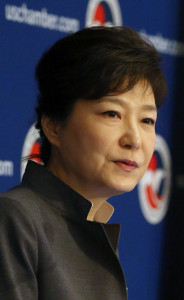South Korea's Textbook Troubles
South Korean President Park Geun-hye announced plans to institute mandated textbooks edited by the government in 2017. Today, schools choose from eight private publishers, but reforms will call on historians and teachers to redraft a new, standardized edition.

Though Education Minister Hwang Woo-yea hopes to write new books that are “objective and balanced” and without a political slant, the Korean History Research Center and over twenty professors from South Korean universities have come out in opposition to the plan. The question of how to portray Korea’s complex history has triggered heated debate between legislators, educators, and political parties. Professors have boycotted the drafting process to protest what they see as whitewashing a brutal time in history.
Park Chung-hee, Park Geun-hye’s father, first introduced the concept of state-issued textbooks as the leader of South Korea in 1974. Even today, Park Chung-hee remains a polarizing figure; he is revered by some as a modernizer and reviled by others as a dictator. In 1971, he won the presidency and declared a state of emergency based on the threat of North Korea. He dissolved the legislature and instituted his own constitution. However, Park transformed South Korea into a major export economy. He also built critical infrastructure linking the two largest cities, though many became displaced due to the construction.
Though some criticize Park’s state-building efforts, his daughter and current president has steadfastly support him. In her autobiography, she wrote that had her father “had no personal ambition other than for” South Korea. She hopes these new textbooks will inspire national pride, and many fear that this implicitly means portraying Park Chung-hee in a positive light.
Beyond personal matters, Park’s effort to cultivate a more nationalistic view of history reflects internal and external struggles plaguing her Saenuri Party. Party Representative and Park-loyalist Suh Chung-won has publicly criticized Party Chairman Kim Moo-sung for trying to unilaterally decide the party’s nomination process in next year’s election. While Suh denies that he plans to run for President, his polling figures make him a threat to pro-Park factions.
The opposition New Party Alliance for Democracy (NPAD) has capitalized on public outrage over the textbook reforms, demanding a meeting between the chairmen of Saenuri and NPAD with Park. The ruling party considers the NPAD’s move an attempt to create a partisan standoff, distracting from important issues such as the economy. Particularly given the party’s 8.9% loss of support in a recent poll, some like Kyung Moon Hwang, a professor at the University of Southern California, see the textbook reforms as Saenuri’s attempt to mobilize the conservative base looking ahead to the elections in the upcoming years.
However, the plan appears to have backfired: On October 20, Gallup Korea indicated that Park’s approval rating has decreased one percent in the span of a week, while politicians who opposed the reforms saw a spike of three percent. Moreover, 47% of participants indicated they do not support uniform textbooks. The debate over how South Korea should portray its history illustrates potential weakness of the ruling Saenuri party, as well as the polarizing legacy of Park Chung-hee. As President Park has professed her allegiance to her father, some fear this will translate into biased representations of the past dictatorship. As politics have brought history to the fore, scholars have warned the government not to sacrifice truth in order to instill national pride.
